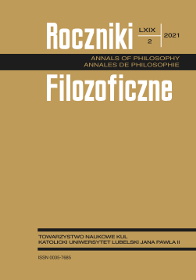Body–Soul and the Birth and Death of Man: Benedict Hesse’s Opinion in the Mediaeval Discussion
Body–Soul and the Birth and Death of Man: Benedict Hesse’s Opinion in the Mediaeval Discussion
Author(s): Wanda BajorSubject(s): Philosophy, History of Philosophy, Philosophy of Middle Ages
Published by: Towarzystwo Naukowe KUL & Katolicki Uniwersytet Lubelski Jana Pawła II
Keywords: soul; human body; matter; birth; semen; embryo; death
Summary/Abstract: This issue was discussed with regard to chosen commentaries to Aristotle’s treatise De anima, formed in the so-called via moderna mainstream, in particular those of John Buridan, Nicole Oresme and Laurentius of Lindores. In such a context, the Cracovian commentaries referring to Parisian nominalists were presented by those of Benedict Hesse and Anonymus. The analyses carried out above allow one to ascertain that although William of Ockham’s opinion questioning the possibility of knowledge of the soul in the field of philosophy, nominalists of the late Middle Ages did not resign from speculation on the beginning (birth) and the separation (death) from the body of the soul, also the fate of the soul after death. They focused on the nature of the matter – human body (embryo, semen) and his relation with the soul (forma) – in the moment of birth. In the aspect of death 14th century scholars undertook the struggle, which was one with the justification of the psycho-physical unity of the human being existing after death solely as an immortal soul. In both thems, they tried to find their solutions, while if they could not solve these aporeticals questions – they had the courage to admit, that is not possible by solely relying on the natural forces of reason. They had to refer to the teaching of christianity, without however falling prey to fideism. This was a methodical endeavour based on the experience that natural reason in searching for the truth is not capable of its own efforts to attain to certain concepts and might on occasion err, it is then that faith becomes its guide and supplies it with more acceptable solutions. This is the courage of one of the greatest philosophers – Plato, who said that you have to have this “great courage” to undertake only probable knowledge, when another is not possible.
Journal: Roczniki Filozoficzne
- Issue Year: 69/2021
- Issue No: 2
- Page Range: 39-63
- Page Count: 25
- Language: English

